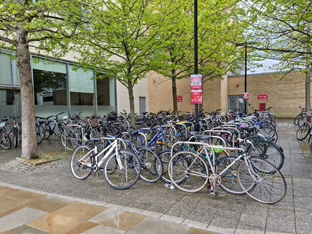The sixth annual Cycle Crime Conference, hosted by BikeRegister, the national cycle database, with British Transport Police (BTP), was the first to run online. The event, usually held at Tally Ho, the West Midlands Police training and conference centre at Edgbaston, Birmingham, was postponed in 2020 (due to covid) but went ahead virtually this summer.
The theme was ‘Let’s Get Back on the Road’. The event heard that although take up of cycling rose dramatically during the pandemic, with a 40pc increase in retail sales, crime has inevitably followed. Hence the conference explored ways that police, government, retailers and the security industry can work together on cycle crime solutions as we finally come out of lockdown.
Representatives from over 80 organisations registered for the event, chaired by Andy Gregory, a former West Midlands Police Sergeant. Guest speakers included Supt Mark Cleland, UK Lead for Cycle Crime at BTP; and Will Norman, Walking & Cycling Commissioner for the Mayor of London.
Supt Cleland explained there is a problem in gaining accurate data on national bike theft. While there were over 300,000 bike thefts reported in the official crime survey across England and Wales alone, only 100,000 thefts were actually reported to police. He said: “We are not fully understanding the level of criminality nationally but there is some really good work going on with organisations like Opal (the national intelligence unit focused on acquisitive crime), insurance companies and BikeRegister to establish the bigger picture.”
If a stolen bike is marked and registered to BikeRegister, it can be traced back to its rightful owner. A recent statistic from BikeRegister claims that a bike owner is 83pc more likely to have their bike stolen if it is not BikeRegister marked.
Supt Cleland added: “Work is being done to encourage marking at point of manufacture as we are aware that retailers are being targeted before bikes are even sold to customers which is a big market for stolen property that we are trying to address. We are also interested in Point of Sale marking as we need to get to the tipping point where every bike being sold in the UK is registered.”
Will Norman added: “We also need to talk about point of service registration. Every time someone brings a bike in to be serviced we need to be offering up that registration, otherwise we are never going to get through that backlog. We need a more efficient and effective mechanism of doing this.”
Mr Norman says there has been a huge increase in the uptake of cycling during the pandemic in London – up to a 270pc increase in some areas – but he claims there is also a real challenge with crime, with around 65,000 bikes a year being stolen. He spoke about the Transport for London (TfL) Cycle Parking Implementation Plan which aims to offer every cyclist in London a safe place to park and detailed some of the new cycling hangars and hubs available in the capital.
Will Norman said: “The responsibility for bike crime is not just with the police. We have to work in partnership with the public sector, the police, transport authorities, shops and mayors like myself.”
Highlighting major societal factors such as chronic diseases, toxic air, congestion and climate change, Mr Norman added: “Bike crime is often considered a minor crime, it is not prioritised as much as other forms of crime but the second biggest barrier to getting people cycling around London is bike crime. I want to thank everyone involved today for all the work that you do. Your role is intrinsic in changing the way people move around their cities.”
Sgt Jo Stephens from the Met Police spoke about a new Seized Bike Procedure being by the force which involves a new system to book in seized bikes that are stored in police stations and involves the bike being registered by officers on BikeRegister. She said: “Ultimately, we need to aim for every bike on the streets to be marked or registered. This way, every bike stopped by police will have an owner who can be contacted. Suspects will be dealt with correctly and bikes returned to owners.”
Police Scotland Sgt Carly Bryce spoke of their wide-ranging Pedal Protect campaign which involves 23,000 officers and staff across 13 divisions in seven cities over 30,000 square miles. The scheme has resulted in a 25pc reduction in bike theft (for the quarter April to June 2020 versus April to June 2021).
Other speakers included Luke Rawlings and Sam Hobbins, Crime Intelligence Analysts from the Opal Team, West Mercia Police. They talked about emerging trends in cycle crime during the pandemic including a rise in the theft of exercise bikes and electric bikes. Other trends include a rise in criminals exploiting cycling apps to target cycle enthusiasts with expensive bikes; and a rise in organised crime targeting bikes stored in commercial premises or in vehicles.
Through the acquisition of funding from the Home Office Safer Streets Fund, Thames Valley Police have been able to introduce a variety of theft deterrents in Oxford (pictured) including enhanced CCTV, 5,000 BikeRegister bike marking kits and safer cycle parking to reduce cycle theft and acquisitive crime in general. Thames Valley Police are keen to tackle the problem of cycle crime as they say too many young people are growing up with ‘an acceptance of bike crime’. They have entered an innovative educational partnership with The Royal Geographical Society relating to bike crime and secondary school pupils in Oxford.
James Brown, BikeRegister MD, gave an update on the latest news from BikeRegister, which includes the fact that the database now contains over a million bike registrations, with new registrations now averaging around 300 a day. A new Stolen Bike page on the website allows owners to be notified when the public see a similar bike listed for sale online.










